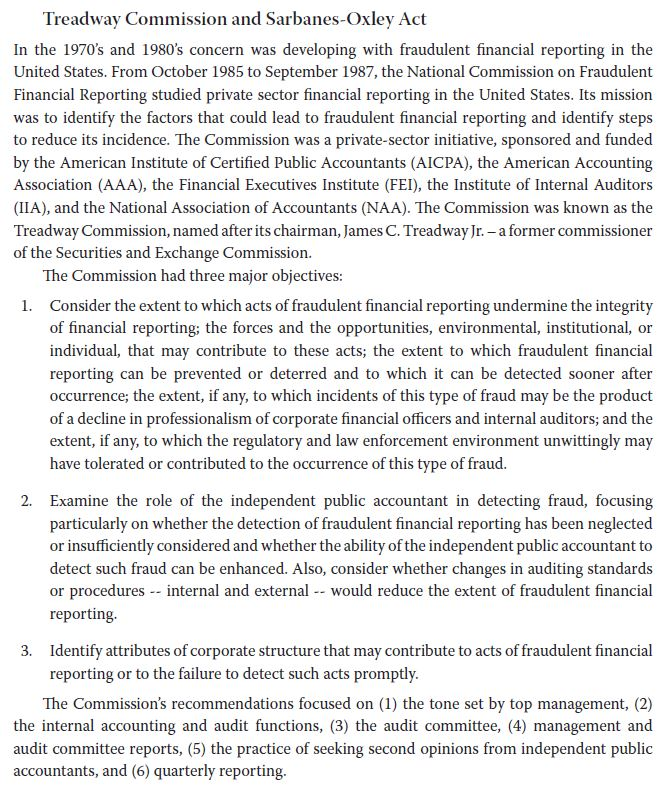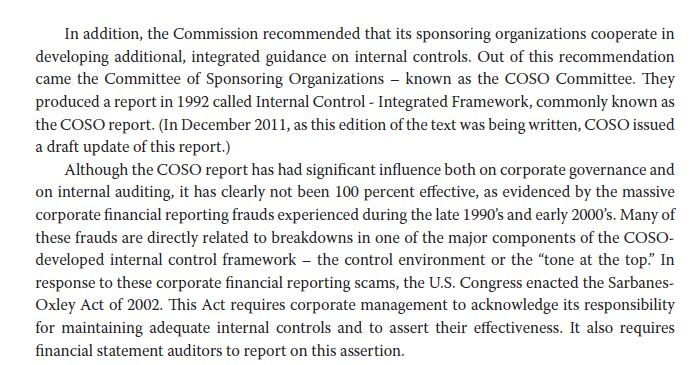Treadway Commission In own words, why is the Treadway Commission so important? Please use the paragraphs below to help answer the question. Please raise thoughtful questions, analyze relevant issues, build on ideas, synthesize across readings and discussions, expanding the perspective, and appropriately challenge assumptions and perspectives.


Treadway Commission and Sarbanes-Oxley Act In the 1970's and 1980's concern was developing with fraudulent financial reporting in the United States. From October 1985 to September 1987, the National Commission on Fraudulent Financial Reporting studied private sector financial reporting in the United States. Its mission was to identify the factors that could lead to fraudulent financial reporting and identify steps to reduce its incidence. The Commission was a private-sector initiative, sponsored and funded by the American Institute of Certified Public Accountants (AICPA), the American Accounting Association (AAA), the Financial Executives Institute (FEI), the Institute of Internal Auditors (IIA), and the National Association of Accountants (NAA). The Commission was known as the Treadway Commission, named after its chairman, James C. Treadway Jr. - a former commissioner of the Securities and Exchange Commission. The Commission had three major objectives: Consider the extent to which acts of fraudulent financial reporting undermine the integrity of financial reporting; the forces and the opportunities, environmental, institutional, or individual, that may contribute to these acts; the extent to which fraudulent financial reporting can be prevented or deterred and to which it can be detected sooner after occurrence; the extent, if any, to which incidents of this type of fraud may be the product of a decline in professionalism of corporate financial officers and internal auditors; and the extent, if any, to which the regulatory and law enforcement environment unwittingly may have tolerated or contributed to the occurrence of this type of fraud. 1. Examine the role of the independent public accountant in detecting fraud, focusing particularly on whether the detection of fraudulent financial reporting has been neglected or insufficiently considered and whether the ability of the independent public accountant to detect such fraud can be enhanced. Also, consider whether changes in auditing standards or procedures internal and external would reduce the extent of fraudulent financial reporting. 2. 3. Identify attributes of corporate structure that may contribute to acts of fraudulent financial reporting or to the failure to detect such acts promptly The Commission's recommendations focused on (1) the tone set by top management, (2) the internal accounting and audit functions, (3) the audit committee, (4) management and audit committee reports, (5) the practice of seeking second opinions from independent public accountants, and (6) quarterly reporting In addition, the Commission recommended that its sponsoring organizations cooperate in developing additional, integrated guidance on internal controls. Out of this recommendation came the Committee of Sponsoring Organizations - known as the COSO Committee. They produced a report in 1992 called Internal Control - Integrated Framework, commonly known as the COSO report. (In December 2011, as this edition of the text was being written, COSO issued a draft update of this report.) Although the COSO report has had significant influence both on corporate governance and on internal auditing, it has clearly not been 100 percent effective, as evidenced by the massive corporate financial reporting frauds experienced during the late 1990's and early 2000's. Many of these frauds are directly related to breakdowns in one of the major components of the COSO- developed internal control framework - the control environment or the "tone at the top." In response to these corporate financial reporting scams, the U.S. Congress enacted the Sarbanes- Oxley Act of 2002. This Act requires corporate management to acknowledge its responsibility for maintaining adequate internal controls and to assert their effectiveness. It also requires financial statement auditors to report on this assertion








